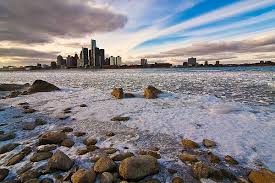 Remember the winter of 2013? Remember last winter?
Remember the winter of 2013? Remember last winter?
Well get ready because chances are we’re headed that way again once winter knocks on the door. And as good as it feels to be enjoying this last stretch of warm weather and breathing in the outdoors without the discomforting sensation of having your lungs freeze inside your chest, it might be advisable to set aside some time – and do a little preventive planning – to prepare for those terrifying energy bills that accompany that icy weather. Halloween may be just a few days away, but nothing is more frightening than a heating bill you can’t afford in the dead of winter.
Indeed, inclement weather has led to increasing demand for financial assistance with heating bills, so Michigan 2-1-1 and the Coalition to Keep Michigan Warm are encouraging residents to get help early. The group, including public service organizations, energy companies and governmental agencies, says that needs are likely to outweigh the available funding, and those seeking help are advised to consider their options as soon as possible.
“The number one reason people call 211 is utility assistance. Roughly a third to 35-40 percent of our calls. People looking for help paying their gas or electric bill. So that translates last year to about 170,000 people called 211 for utilities statewide,” said Michigan 211 Executive Director Tom Page. “The biggest spike for assistance is in October.”
Many energy companies offer payment plans which extend flexibility when times are tough. In addition, customers behind on their energy bills can apply for help in paying past-due balances starting in October if their income is at or below 150 percent of the poverty level (see chart).
| FAMILY SIZE | Maximum Gross Household Income (150% poverty level) | |
|
Monthly |
Annual |
|
| 1 | $1,471 | $17,655 |
| 2 | $1,991 | $23,895 |
| 3 | $2,511 | $30,135 |
| 4 | $3,031 | $36,375 |
| 5 | $3,551 | $42,615 |
| 6 | $4,071 | $48,855 |
| 7 | $4,591 | $55,095 |
“We encourage Michigan residents to get an early start planning for winter bills and learning about helpful ways to stay safe and warm this winter,” said Whitney Skeans, Customer Assistance Manager at Consumers Energy and a member of the Coalition to Keep Michigan Warm. “Rather than falling behind, there are many options for Michiganders to work with their energy companies and access available resources to keep their costs on track.”
Two primary programs offer energy assistance for income-qualified households with past due bills: the Michigan Energy Assistance Program (MEAP) and the Michigan Department of Health and Human Services’ State Emergency Relief (SER) program. MEAP is already accepting applications and is available year-round or as funding lasts. Thirteen organizations administer the program in different parts of the state. Consumers can find more information at www.michigan.gov/energygrants.
The Department of Health and Human Services’ State Emergency Relief (SER) program starts Nov. 1 and runs through May 31 each year. Individuals can apply online at www.mibridges.michigan.gov.
Once an application and verifications are processed, customers should receive a notice within 10 business days letting them know the status of processing. Customers can get help both with utility bills and propane payments.
Some community-based organizations and agencies around the state are trained as navigators to provide assistance with the online State Emergency Relief application. Customers can find help at www.mibenefitsaccess.org or by calling Michigan 2-1-1.
State law protects senior citizen customers of many energy companies from having their heat disconnected between Nov. 1and March 31. However, it’s important for customers to pay what they can and get assistance when needed to avoid larger bills later on. Those who have recently become a senior citizen are encouraged to inform their energy company and inquire about other senior services and offers.
Oddly enough, although seniors are protected from shutoffs during winter months, and more assistance is available for others, the result in recent years when the winters have been particularly harsh is that all the funds are dried up by the end of the winter, which means nothing is available later on when folks may still need help.
“We’ve actually seen the three worst months for unmet need are June July and August. So people are getting shut off in June July and August because all the funding that’s available has been tapped out,” said Page.
Finally, one of the best places to find out more about energy assistance programs is by calling Michigan 2-1-1. Michigan 2-1-1 is a free, confidential service that connects Michigan residents with local community-based organizations across the state offering thousands of different programs and services for people seeking answers.
“No family should have to fear losing their power in the dead of winter,” said Page. “Calling 2-1-1 is a great way for Michigan residents to get help understanding their options for keeping warm this winter.”

